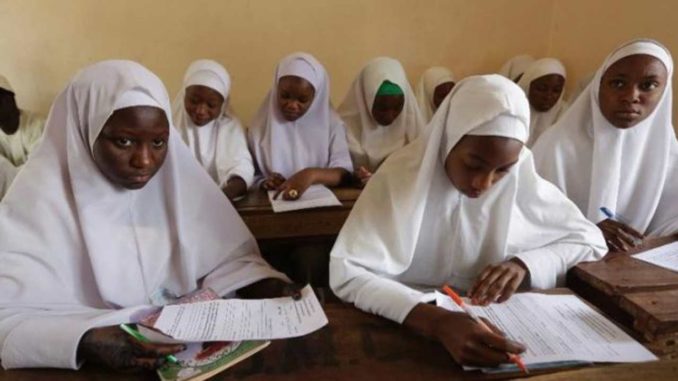
Recurrent controversy and litigation over use of hijab in place of school uniforms has become part of needless issues in our quest for nation building.
There should be elite consensus on the issue as soon as possible.
While the nation is still smarting from the University of Ibadan International School’s crisis on the same issue, the Ladoke Akintola University of Technology (LAUTEC) International School, Ogbomosho has barred 55 of its female students from entering the school’s premises over the use of hijab, a veil worn by female Muslims when not in the company of immediate family members.
A report said the Muslim community in the school had made a request to the school’s governing council in 2011 to permit the use of the hijab by willing female Muslim students.
However, having waited without a response from the authorities, the community had decided that willing female students of the institution should begin the use of the hijab from the January 7, 2019. But the school authorities rejected the recourse to self-help, in this regard and barred the students from the school.
The ensuing controversy over the use of the hijab by students of our educational institutions is rather worrisome considering the frequency of these incidents.
In recent past, we have witnessed the shutdown of the University of Ibadan International School for the same reason.
There was an initial refusal by the Nigeria’s Council of Legal Education to admit Amasa Firdaus to the Nigerian Bar on hijab. There had been a protest in Osun State over the use of the hijab by female Muslim students in violation of the school’s dress code.
No doubt, the country is already plagued by ethnic, political and religious conflicts and so such an issue deserves the attention of all stakeholders to prevent its escalation.
The word hijab is culled from the Arabic “hajaba”, which means to conceal or hide from view and generally refers to modest dressing by Islamic women but has now been signified by the headscarf/veil adorned by most Islamic women in public and in fulfilment of their religious beliefs that a lady must not expose certain parts and or features of her body in the presence of a man who is not her spouse or a member of her family.
It should be noted that originally the hijab was not a religious attire but a mode of dressing of a given (Middle Eastern) people which was dictated by climatic conditions and has even been ascribed to persons of Christian faith. However, many Islamic faithful have found support for its observance in the Quran and as a foundation for their belief.
This belief, like other religious beliefs, in so far as they are not contrary to public policy, decency, safety and or health, are protected and guaranteed by the Constitution of the Federal Republic of Nigeria.
Section 38 (1) provides that, “Every person shall be entitled to freedom of thought, conscience and religion, including freedom to change his religion or belief (either alone or in community with others, in public or private) to manifest and propagate his religion or belief in worship, teaching, practice and observance.”
This provision in the organic law has been given further pronouncement in a number of judicial authorities, as the Court of Appeal has held that the right to wear a hijab within the school campus or indeed anywhere else is constitutionally guaranteed, as it constitutes an open manifestation, propagation, worship, teaching, practice and observance of one’s religion and the forbiddance of which is discriminatory and a violation of the individual’s human right.
In as much as the rights to respective religious practices are guaranteed, we must, however, be careful not to lose sight of the fundamental objectives of our educational institutions, which is the bedrock for the inculcation of certain vital values for the development of the individual and ultimately the nation.
In spite of the diverse religious beliefs of its people, the Constitution equally recognises Nigeria as a secular State, as such policies of our public educational institutions should be devoid of religious influences.
We must remember that our respective rights are circumscribed by that of others, for if every student were to be allowed to openly practise their religious beliefs in our public schools, (and wear religious uniforms) it will no doubt lead to disorderliness and ultimately defeat the purpose of a formal education, for some practices might be considered offensive by others.
Religion is like a twin-edge sword that can build or protect, depending on whoever wields it. So, we must find a balance and ensure that greater good prevails.
We must as a nation of diverse ethnic and religious practices learn to be tolerant of the practices and beliefs of others as that is the only way we can be sure of a peaceful coexistence.
Our personal religious beliefs should be a point of convergence and not one of division.
But the highpoint here is that as we noted the other day on this same issue, there should be no controversy over what school uniform should be.
Schools should be allowed to enforce their school rules and parents should abide by these rules and allow their children to learn with simplicity.
The elite consensus that has prevailed on school uniform for decades should not be compromised at this time.
Parents should be more concerned about quality of instruction and discipline in the school.
Law and order should not be allowed to break down to the extent of closing down schools because of religious issues that are new to school’s public policy.
In the main, leaders at all levels who control the schools should step in and empower school authorities to enforce their rules of engagement.
END

Be the first to comment